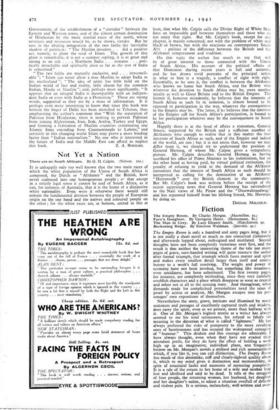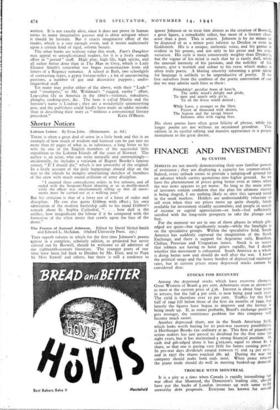Fiction
The Empty Room is only .a hundred and sixty pages long, -but it is not really a short novel so much as one conceived elaborately and afterwards lopped about, redesigned and mutilated. Second thoughts have not been completely victorious over -first, and the result is that neither the interesting theme of the tale nor many pages of grave, sure-handed writing will quite reassure the seeker after formal triumph, that triumph which fuses matter and spirit and makes every smallest detail larger -than itself and contri- butory to a work's full resolving. The -.weight and power of economy -have -not been invoked, but something like weariness, even untidiness, has been substituted. The first twenty pages, for instance are completely misleading, Since they very carefully establish characters and 'a -place Which disappear as soon as created -and relate not at all to the epsuing story. And throughout, when demands made for complicated personalities need the onus of proof by action or anglysis, Mr. Morgan ,escapes into his per- sonages' own expositions of themselves.
'Nevertheless the story, grave, intricate and illumined lay many sentences and passages of excellently captured truth and wisdom, does carry the spirit, even as we protest, more than 'halfway with it. One of Mr. Morgan's highest merits as a writer has always seemed to me his total seriousness, 'his refusal to falsify his meaning in the direction of what is called '"lightness." He has always preferred the risks of pomposity to the more revolting ones of facetiousness and has escaped the widespread contagion of " humour." This disdain and this courage are admirable, I have always thought, even when they have not evaded their attendant perils, for they do have the effect of holding a work high up in an imaginative, -individual plane, and 'frequently bestow on Mr. Morgan's novels a stylised and rich unnaturalness- which, if you 'like it, you can call distinction. The Empty Room has 'much of this dreamlike, stiff and clearly-lighted quality .about it, which to my mind gives it distinction and memorability, in spite of structural faults and moments of menacing pomposity. It is a tale of the return to her home -of a -wife and mother long lost and idealised and said to be dead. It tells of the struggles of four people, the returning woman, her husband, her daughter and her -daughter's suitor, to adjust .a situation overfull of delicate and violent pain. It is serious, melancholy, Well written and over-
written. It is not exactly alive, since it does not prove in human terms its many imaginative guesses and is often arrogant where it should be hesitant. But it exacts imaginative effort of the reader, which is a rare enough event, and it insists audaciously upon a certain kind of rigid, solemn beauty.
The other books are without value this week. Faro's Daughter may appeal to unsophisticated readers, for it is a lively enough effort in " period " stuff. High play, high life, high spirits, and all rather better done than in The Man in Grey, which is Lady Eleanor Smith's somewhat too bogus reconstruction from old letters of a Regency romance. A school at Bath, two schoolgirls of contrasting types, a gypsy fortune-teller ; a lot of unconvincing passions, a number of gay and decorative puppets ; undis- tinguished stuff.
Yet many may prefer either of the above, with their " Luds " and " strumpets," to Mr. Waldman's " rugged, earthy " effort. Log-cabin life in America in the 'Soo's—violence, nakedness, ploughs, cooking-pots, &c. The hero is called Martin and the heroine's name is Lindsay ; they are a wonderfully uninteresting pair, and the publishers could hardly have made an odder mistake than in describing their story as " without a conventional literary























 Previous page
Previous page